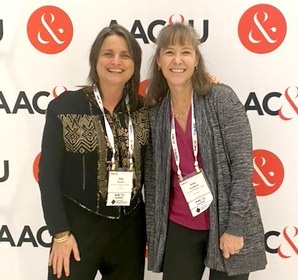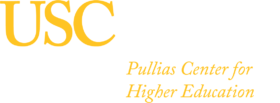By Zoë Corwin and Amy Goodburn
One of the most compelling aspects of research-practice partnerships is drawing on diverse expertise in pursuit of making an impact. The PASS Project, with its focus on fostering a culture of ecological validation to improve academic and psychosocial outcomes for at-promise students, is a meaningful illustration of how RPPs can be effective.
At the recent Association for Undergraduate Education at Research Universities’ annual conference, Zoë Corwin (The Pullias Center) and Amy Goodburn (University of Nebraska-Lincoln) shared their perspectives on the value of RPPs, as well as the strategies that they have employed to cultivate a successful partnership between the Pullias Center, the University of Nebraska-Lincoln (UNL) and the project’s funder, the Susan Thompson Buffett Foundation.
Launched in 2015, the Promoting At-promise Student Success (PASS) study sought to determine whether, how and why the Thompson Scholar Learning Communities comprehensive college transition programs at three University of Nebraska campuses translated into greater student academic and psychosocial success (for details please see the new book, Creating a Campus-wide Culture for Student Success). In 2020, the project expanded to include a series of Professional Learning Communities (PLCs) designed to provide a space for administrators, staff and faculty to apply lessons learned from the first phase of the study (PASS1) to shift institutional culture in support of at-promise student success.
Practitioner perspective — Amy Goodburn on the value of RPPs in providing a space to reflect on student success initiatives
As a campus leader charged with improving degree completion and equity outcomes, the PASS research-practice partnership has given me a valuable framework for grounding, articulating and assessing UNL’s student success initiatives more broadly. While UNL is a research university, we often focus more on implementing and administering programs than researching them. A key benefit of the PASS partnership is that our collaboration provides ongoing and dedicated time and space to reflect on institutional efforts with someone who is not tied to the institution.
Zoë and Pullias Postdoctoral Scholar Mariama Nagbe have served as critical thought partners; asking questions that help me to think more intentionally about why we are doing what we are doing and to consider — from the ground up — how documenting impact might be achieved. Our partnership has also illuminated challenges in systemically taking a research lens to the daily work in which we engage. The PASS research-practice partnership has affirmed the value of UNL’s efforts to support at-promise scholars and enabled me to see how insights gained from studying our campus might benefit other postsecondary practitioners engaged in similar work.
Researcher perspective — Zoë Corwin on strategies for nurturing and sustaining RPPs
Research-practice partnerships have the potential to develop in hierarchical ways due to the perceived expertise of the research partner. It’s critical for researchers to recognize this pitfall and be vigilant about creating an equitable collaboration. Practitioners have a powerful role in helping orient researchers by sharing resources they deem important and helping steer the direction of inquiry. In latter stages of the RPP, establishing and maintaining trust is key in fostering a productive partnership. The trust process entails carving out ample time to learn, unlearn and reflect together.
Our PLC was structured around a crystal-clear goal — to bolster the work UNL is doing around at-promise student success. The fact that researchers and practitioners all shared a deep commitment to this common goal anchored our work and elevated the time we spent together. PLC participants were selected into the group due to their track record or potential as change agents for supporting at-promise student success – and researchers joined the study team due to their interest in learning about how practitioners were doing this work. Commitment to common goals informed all aspects of our work together.
Despite lots of planning and intentionality on the research team’s part, it was vital for us to remain flexible and adapt to the PLC’s needs and interests. This entailed communicating clearly about schedules and agendas in order to keep participants engaged; developing mechanisms for figuring out what was working (or not); and engaging in research reciprocity. In the academic world, researchers are seldom rewarded for producing practitioner briefs or videos; presenting at practitioner conferences is not incentivized.
When practitioners are entering into research-practice partnerships — and when funders are supporting this type of work — it’s critical to require practice-based materials as deliverables. And for academics, it’s essential to incorporate funding requests to support graphic designers or web-support in order to make sure that research findings are translated in ways that resonate with practice partners.
Please check out the practice page of the PASS project website for examples of deliverables created for a practitioner audience, several developed in partnership with our RPP partners.







